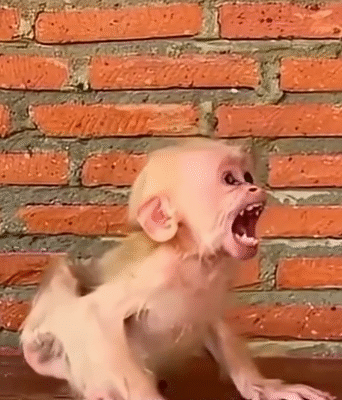In the dense, humid heart of the jungle, where sunlight filtered through layers of green canopy and the sounds of nature never ceased, a heartbreaking scene unfolded. A tiny baby monkey, no bigger than a coconut, clung to a low-hanging branch, sobbing in soft, choked cries that seemed too human for a creature so small. His name was Kavi, and though his eyes were wide and innocent, they were stained with tears of pain and confusion.
Kavi had been born into a troop of rhesus macaques, a close-knit group that thrived near a jungle river. Most baby monkeys were cherished and closely guarded by their mothers, held tight against their warm chests and nursed lovingly. But for reasons unknown to him, Kavi’s mother had grown cold. She had once cuddled him, groomed his soft fur, and whispered gentle coos as he dozed. But over the past week, her behavior changed. She shoved him away, ignored his cries, and sometimes delivered sharp slaps when he tried to cling to her.
That morning had been the worst yet.
Kavi had reached out to her as she sat eating figs by the water’s edge. Hungry and desperate for comfort, he crawled toward her on shaky limbs. Instead of pulling him close, she shrieked and struck him with the back of her hand. The force of the blow knocked him off balance and into the mud. The rest of the troop barely looked up. This wasn’t the first time.
His wails echoed through the forest, not loud, but piercing—like smoke from a fire before flames break free. His tiny body quivered, not just from the hit, but from the heartbreak of rejection. It was a kind of grief he couldn’t understand, only feel—a raw, primal pain.
He cried like a forest fire, not in volume but in devastation. His sobs were the crackling of burning leaves, his breath hitched like wind rushing through scorched trees. The jungle, alive and indifferent, moved on. Birds chirped, frogs croaked, and leaves rustled, paying no mind to the tiny soul unraveling among them.
A few feet away, an older female monkey named Tara watched silently. She had lost her own baby during the last rainy season to a leopard. Her heart, heavy with memories, ached at the sound of Kavi’s cries. Slowly, she climbed down from her perch and approached him.
Kavi looked up, eyes red and cheeks muddy, unsure whether to flinch or hope. Tara gently touched his back, then sat beside him, offering a piece of fruit. He hesitated, then accepted it, holding it like a treasure. She didn’t speak—monkeys didn’t need to—but her presence spoke louder than words. She stayed beside him as he ate, his sobs quieting into hiccups.
His mother watched from afar, her eyes narrowing. Something flickered across her face—resentment, perhaps, or guilt. But she didn’t move.
As the sun sank behind the canopy and dusk painted the sky in shades of lavender and gray, Kavi nestled against Tara. He still missed the warmth of his mother’s chest, the familiar rhythm of her heartbeat. But for now, Tara’s gentle breathing would do. Her arms, though not his mother’s, wrapped around him like a promise.
In the wild, survival often demands strength over softness. But sometimes, even in the cold mechanics of nature, compassion finds a crack. Tara, with her grieving heart, filled the void left by another’s neglect. And Kavi, with his forest-fire tears now cooled, began to heal.
He would never forget the pain—those early memories etched into his spirit—but he would grow. One day, he might climb the highest tree and sing his story to the wind, reminding the jungle that even in the harshest places, love can take root in unexpected soil.
